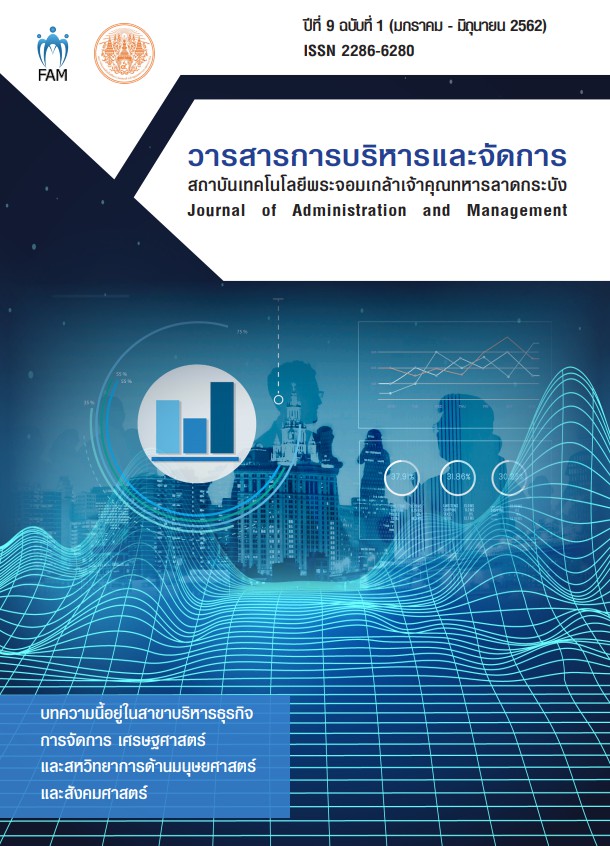ENERGY SAVING BEHAVIOR IN DRIVING AND MARKRTING MIX IN THE CONSUMER’S PERSPECTIVE ON ELECTRIC VEHICLE OF PASSENGER CARS IN CENTRAL REGION
Main Article Content
Abstract
The objectives of studying about passenger car drivers’ energy conservation behavior and perspectives of passenger car drivers by using questionnaires to collect data. Statistical analysis is Average frequency, standard deviation And using the hypothesis testing by Chi-square test. Paired by Fisher’s Least Significant Difference (LSD) method. The result found that the majority of the participants are married men between the ages of 31 and 40, with child or children, with 3 to 5 family members, graduated with bachelor’s degree, work as a company employee and have monthly car fuel expense from 1,501 baht to 5,200 baht. The participants have daily driving energy conservation behavior with a purpose of reducing car fuel expense approximately 1,000 baht per month by switching to consume fuel with cheaper prices. The participants’ perspectives on electric vehicles when considering 4C’s Marketing Mix reveal that the participants demand public relations communication, government support and the number of vehicle electric charging stations to create their confidence to use electric vehicles. The study results about the relationship between the respondents’ personal factors and personal car drivers’ perspectives on electric vehicles show that the differences of gender, age, occupation, income and marital status lead to the different perspectives on electric vehicles. On the other hands, education level and number of family members do not have relationship with persona car drivers’ perspectives on electric vehicles. In addition, the findings also expose that passenger car drivers’ energy conservation behavior has relevant relationship with personal car drivers’ perspectives on electric personal vehicles. The minor energy conservation behaviors are fuel filling frequency and fuel expense that can be reduced. The objectives of energy conservation have relationship only with consumers’ demand and cost that can be saved.
Article Details
Journal of KMITL Business School is available both online and in printed version.
**All articles or opinions presented in this issue of the Journal of KMITL Business School reflect the thoughts of their respective authors. This journal serves as an independent platform for a variety of viewpoints. Authors bear full responsibility for the content of their articles.**
**All articles published in this journal are copyrighted by KMITL Business School, King Mongkut's Institute of Technology Ladkrabang. The editorial team permits copying or using articles, but a reference to the journal is required.**
References
กรมการขนส่งทางบก. (2561, ธันวาคม). กลุ่มงานสถิติการขนส่ง กองแผนงาน. สืบค้นเมื่อ 13 มกราคม 2561, จาก http://apps.dlt.go.th/statistics_web/vehicle.html
กัลยา วาณิชย์บัญชา. (2544). การวิเคราะห์สถิติ. สถิติเพื่อการตัดสินใจ (พิมพ์ครั้งที่ 5). กรุงเทพฯ: คณะพาณิชย์ศาสตร์ และการบัญชี จุฬาลงกรณ์มหาวิทยาลัย.
กิตติยา หนูมี. (2557). ทัศนคติของผู้บริโภคที่มีต่อรถยนต์อีโค่คาร์ในเขตกรุงเทพมหานคร. วิทยานิพนธ์. สาขาบริหารธุรกิจมหาบัณฑิต. มหาวิทยาลัยเทคโนโลยีราชมงคลธัญบุรี.
เกียรติพงษ์ อุดมธนะธีระ. (2562). กลยุทธ์การตลาด 4Ps + 4Cs และส่วนผสมทางการตลาด. สืบค้นเมื่อ 2 เมษายน 2561, จาก http://ioklogistics.blogspot.com/2017/09/marketing-mix-4ps-4cs.html
จารุพันธ์ ยาชมภู. (2559). ปัจจัยที่ส่งผลต่อการตัดสินใจเลือกซื้อรถยนต์ ขนาดไม่เกิน 1,500 ซีซี. วิทยานิพนธ์. สาขาบริหารธุรกิจมหาบัณฑิต. มหาวิทยาลัยธรรมศาสตร์.
ชไมพร กาญจนกิจสกุล. (2556). ระเบียบวิธีวิจัยทางสังคมศาสตร์ (พิมพ์ครั้งที่ 2). กรุงเทพฯ: จุฬาลงกรณ์มหาวิทยาลัย.
ธีรพงศ์ เทพหัสดิน ณ อยุธยา. (2558). ปัจจัยที่มีอิทธิพลต่อการตัดสินใจซื้อรถยนต์อีโคคาร์ (Eco-Cars) ของผู้บริโภคในกรุงเทพมหานคร. วิทยานิพนธ์. สาขาเศรษฐศาสตรมหาบัณฑิต. มหาวิทยาลัยเกษตรศาสตร์.
ปณิศา มีจินดา. (2553). พฤติกรรมผู้บริโภค (พิมพ์ครั้งที่ 1). กรุงเทพมหานคร: ธรรมสาร.
พีระยุทธ คุ้มศักดิ์และพิบูลย์ ลิมประภัทร. (2558). ปัจจัยที่ส่งผลต่อการตัดสินใจซื้อรถยนต์ประหยัดพลังงานมาตรฐานสากล(รถยนต์อีโค่คาร์) ในด้านส่วนประสมทางการตลาดของประชากรในเขตกรุงเทพมหานคร. วิทยานิพนธ์. สาขาบริหารธุรกิจ. มหาวิทยาลัยนอร์ทกรุงเทพ.
ยุทธ ไกยวรรณ์.(2553). หลักสถิติวิจัยและการใช้โปรแกรม SPSS. กรุงเทพฯ: จุฬาลงกรณ์มหาวิทยาลัย.
วริษฐ์ จารุเกียรติพงศา. (2557). แนวโน้มรถยนต์ประหยัดพลังงานในประเทศไทย ทัศนะของผู้บริโภค. วิทยานิพนธ์ปริญญาบริหารธุรกิจมหาบัณฑิต. มหาวิทยาลัยเนชั่น. กรุงเทพมหานคร.
อดุลย์ จาตุรงคกุล. (2543). พฤติกรรมผู้บริโภค (พิมพ์ครั้งที่ 6) กรุงเทพฯ : มหาวิทยาลัยธรรมศาสตร์.
อำนาจ พนาคุณากร. (2555). ปัจจัยแวดล้อมในการดำรงชีวิตที่ส่งผลต่อการตัดสินใจซื้อรถยนต์ Eco-Car ในเขตกรุงเทพมหานคร. วิทยานิพนธ์ปริญญาบริหารธุรกิจมหาบัณฑิต. มหาวิทยาลัยกรุงเทพ.


